Detailed Analysis of Islamic Banking Operations and Finance
VerifiedAdded on 2020/02/03
|15
|5433
|41
Report
AI Summary
This report provides a detailed analysis of Islamic banking operations, focusing on the principles and trends within the industry. It explores the impact of recession on Islamic bonds (Sukuk), comparing them with conventional bonds and examining the role of Dubai as a global center for Islamic finance. The report identifies companies utilizing Islamic bonds and evaluates the differences between various Islamic financial instruments, including Mudarabah, Musharakah, Ijarah, and Istisn'a. Additionally, it discusses the Wadiah concept in Bank Islam Malaysia, analyzes opportunity risk, compares returns of saving accounts, and explores investment opportunities in the Islamic banking and finance industry. The report concludes with a discussion on saving and investment options in Malaysia, Saudi Arabia, and the UAE, offering a comprehensive overview of the key aspects of Islamic banking operations and financial instruments.
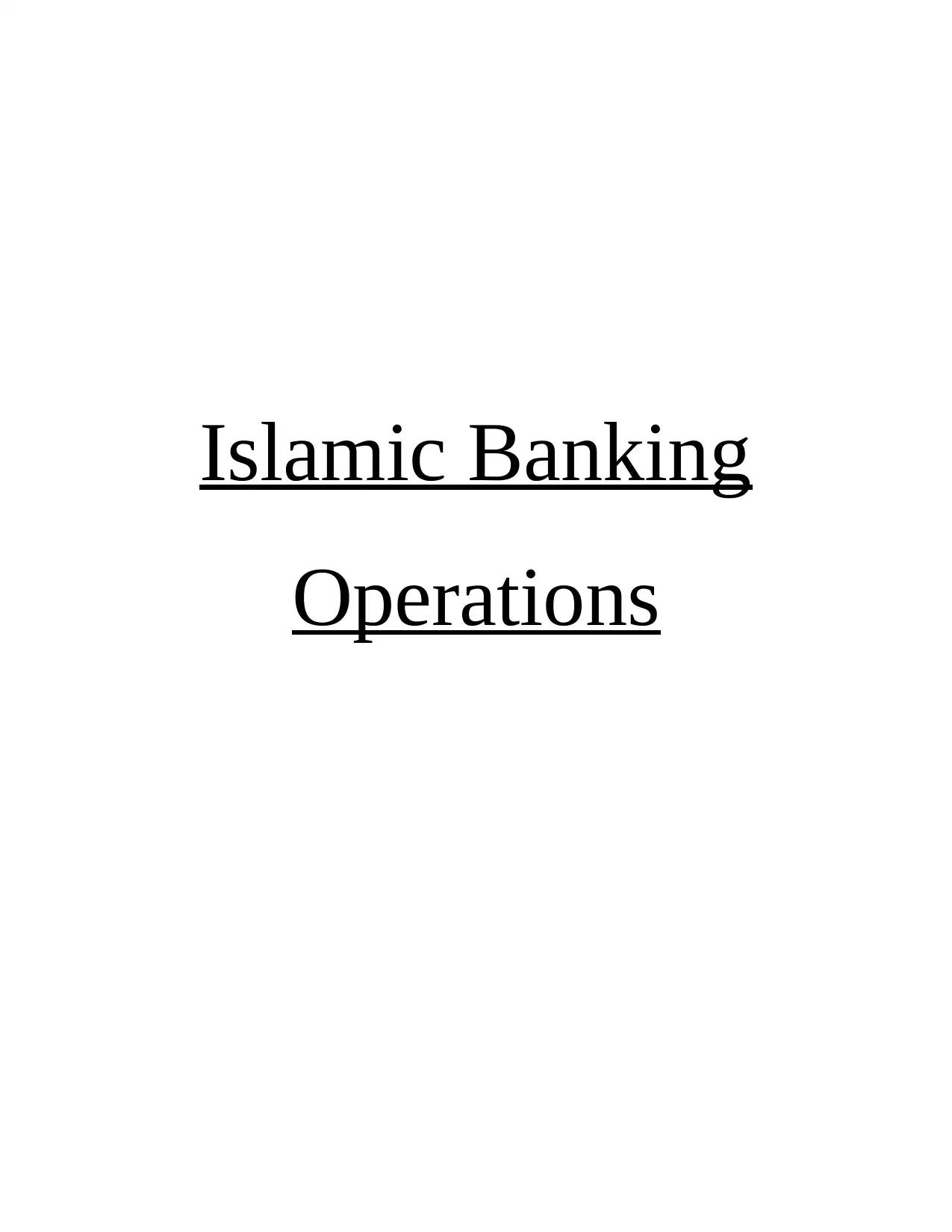
Islamic Banking
Operations
Operations
Paraphrase This Document
Need a fresh take? Get an instant paraphrase of this document with our AI Paraphraser
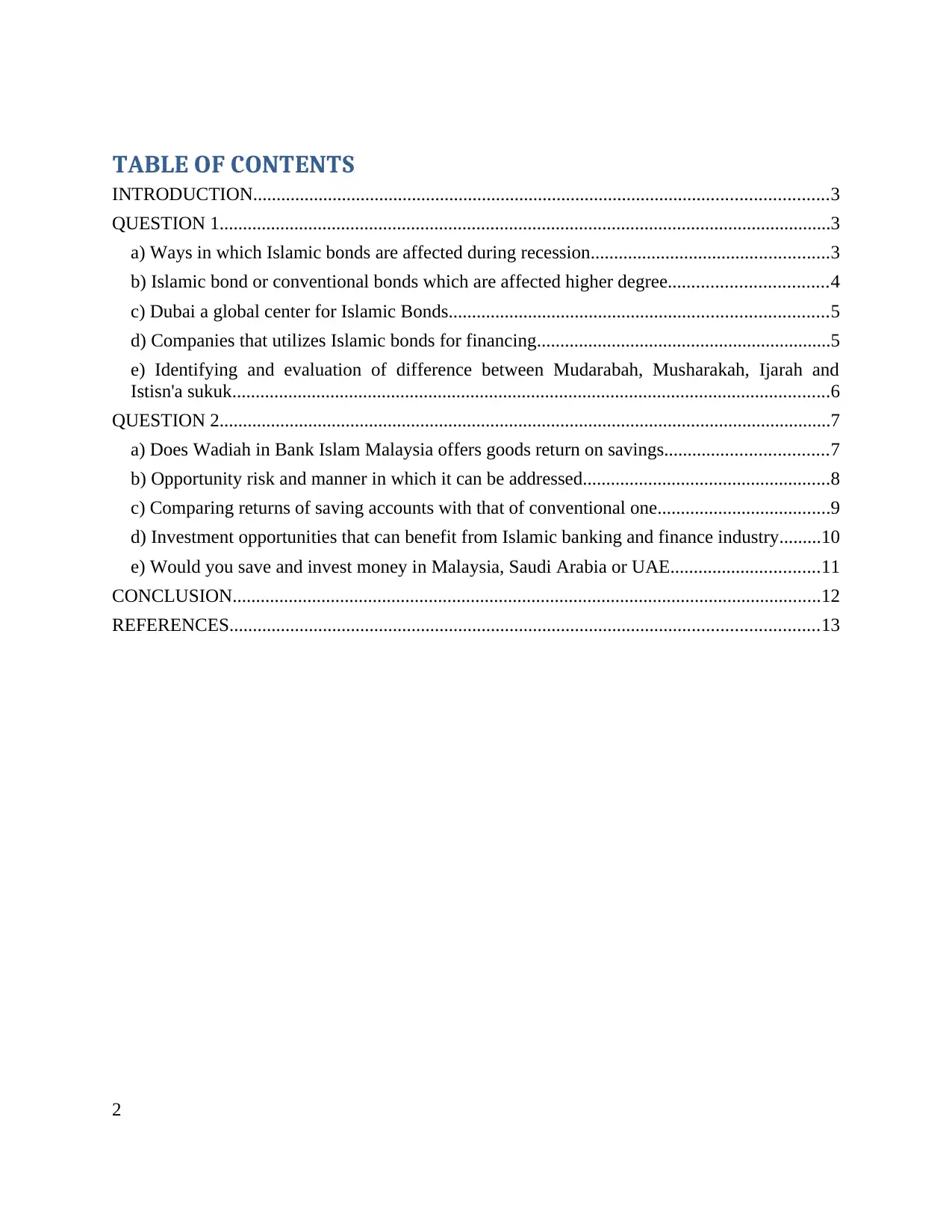
TABLE OF CONTENTS
INTRODUCTION...........................................................................................................................3
QUESTION 1...................................................................................................................................3
a) Ways in which Islamic bonds are affected during recession...................................................3
b) Islamic bond or conventional bonds which are affected higher degree..................................4
c) Dubai a global center for Islamic Bonds.................................................................................5
d) Companies that utilizes Islamic bonds for financing...............................................................5
e) Identifying and evaluation of difference between Mudarabah, Musharakah, Ijarah and
Istisn'a sukuk................................................................................................................................6
QUESTION 2...................................................................................................................................7
a) Does Wadiah in Bank Islam Malaysia offers goods return on savings...................................7
b) Opportunity risk and manner in which it can be addressed.....................................................8
c) Comparing returns of saving accounts with that of conventional one.....................................9
d) Investment opportunities that can benefit from Islamic banking and finance industry.........10
e) Would you save and invest money in Malaysia, Saudi Arabia or UAE................................11
CONCLUSION..............................................................................................................................12
REFERENCES..............................................................................................................................13
2
INTRODUCTION...........................................................................................................................3
QUESTION 1...................................................................................................................................3
a) Ways in which Islamic bonds are affected during recession...................................................3
b) Islamic bond or conventional bonds which are affected higher degree..................................4
c) Dubai a global center for Islamic Bonds.................................................................................5
d) Companies that utilizes Islamic bonds for financing...............................................................5
e) Identifying and evaluation of difference between Mudarabah, Musharakah, Ijarah and
Istisn'a sukuk................................................................................................................................6
QUESTION 2...................................................................................................................................7
a) Does Wadiah in Bank Islam Malaysia offers goods return on savings...................................7
b) Opportunity risk and manner in which it can be addressed.....................................................8
c) Comparing returns of saving accounts with that of conventional one.....................................9
d) Investment opportunities that can benefit from Islamic banking and finance industry.........10
e) Would you save and invest money in Malaysia, Saudi Arabia or UAE................................11
CONCLUSION..............................................................................................................................12
REFERENCES..............................................................................................................................13
2
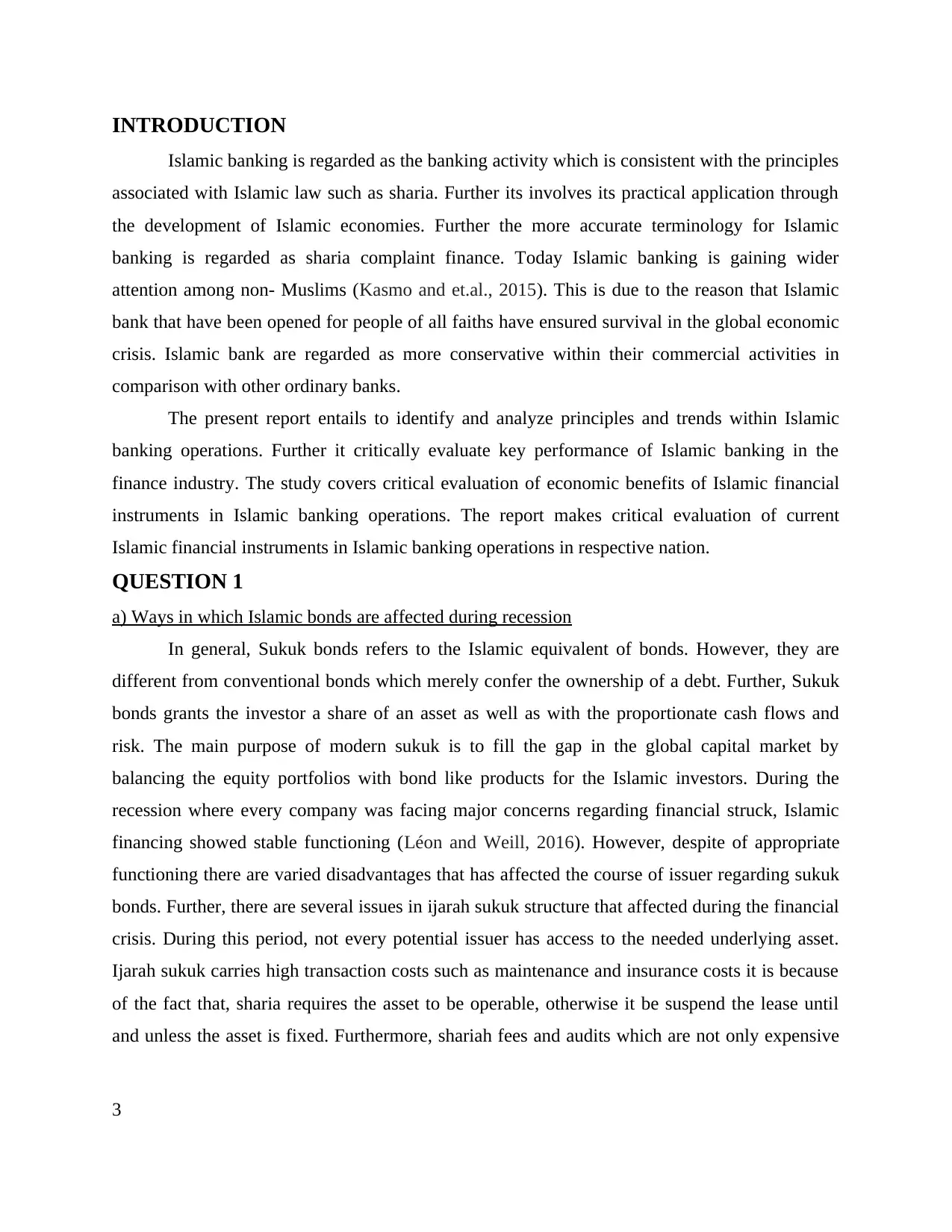
INTRODUCTION
Islamic banking is regarded as the banking activity which is consistent with the principles
associated with Islamic law such as sharia. Further its involves its practical application through
the development of Islamic economies. Further the more accurate terminology for Islamic
banking is regarded as sharia complaint finance. Today Islamic banking is gaining wider
attention among non- Muslims (Kasmo and et.al., 2015). This is due to the reason that Islamic
bank that have been opened for people of all faiths have ensured survival in the global economic
crisis. Islamic bank are regarded as more conservative within their commercial activities in
comparison with other ordinary banks.
The present report entails to identify and analyze principles and trends within Islamic
banking operations. Further it critically evaluate key performance of Islamic banking in the
finance industry. The study covers critical evaluation of economic benefits of Islamic financial
instruments in Islamic banking operations. The report makes critical evaluation of current
Islamic financial instruments in Islamic banking operations in respective nation.
QUESTION 1
a) Ways in which Islamic bonds are affected during recession
In general, Sukuk bonds refers to the Islamic equivalent of bonds. However, they are
different from conventional bonds which merely confer the ownership of a debt. Further, Sukuk
bonds grants the investor a share of an asset as well as with the proportionate cash flows and
risk. The main purpose of modern sukuk is to fill the gap in the global capital market by
balancing the equity portfolios with bond like products for the Islamic investors. During the
recession where every company was facing major concerns regarding financial struck, Islamic
financing showed stable functioning (Léon and Weill, 2016). However, despite of appropriate
functioning there are varied disadvantages that has affected the course of issuer regarding sukuk
bonds. Further, there are several issues in ijarah sukuk structure that affected during the financial
crisis. During this period, not every potential issuer has access to the needed underlying asset.
Ijarah sukuk carries high transaction costs such as maintenance and insurance costs it is because
of the fact that, sharia requires the asset to be operable, otherwise it be suspend the lease until
and unless the asset is fixed. Furthermore, shariah fees and audits which are not only expensive
3
Islamic banking is regarded as the banking activity which is consistent with the principles
associated with Islamic law such as sharia. Further its involves its practical application through
the development of Islamic economies. Further the more accurate terminology for Islamic
banking is regarded as sharia complaint finance. Today Islamic banking is gaining wider
attention among non- Muslims (Kasmo and et.al., 2015). This is due to the reason that Islamic
bank that have been opened for people of all faiths have ensured survival in the global economic
crisis. Islamic bank are regarded as more conservative within their commercial activities in
comparison with other ordinary banks.
The present report entails to identify and analyze principles and trends within Islamic
banking operations. Further it critically evaluate key performance of Islamic banking in the
finance industry. The study covers critical evaluation of economic benefits of Islamic financial
instruments in Islamic banking operations. The report makes critical evaluation of current
Islamic financial instruments in Islamic banking operations in respective nation.
QUESTION 1
a) Ways in which Islamic bonds are affected during recession
In general, Sukuk bonds refers to the Islamic equivalent of bonds. However, they are
different from conventional bonds which merely confer the ownership of a debt. Further, Sukuk
bonds grants the investor a share of an asset as well as with the proportionate cash flows and
risk. The main purpose of modern sukuk is to fill the gap in the global capital market by
balancing the equity portfolios with bond like products for the Islamic investors. During the
recession where every company was facing major concerns regarding financial struck, Islamic
financing showed stable functioning (Léon and Weill, 2016). However, despite of appropriate
functioning there are varied disadvantages that has affected the course of issuer regarding sukuk
bonds. Further, there are several issues in ijarah sukuk structure that affected during the financial
crisis. During this period, not every potential issuer has access to the needed underlying asset.
Ijarah sukuk carries high transaction costs such as maintenance and insurance costs it is because
of the fact that, sharia requires the asset to be operable, otherwise it be suspend the lease until
and unless the asset is fixed. Furthermore, shariah fees and audits which are not only expensive
3
⊘ This is a preview!⊘
Do you want full access?
Subscribe today to unlock all pages.

Trusted by 1+ million students worldwide
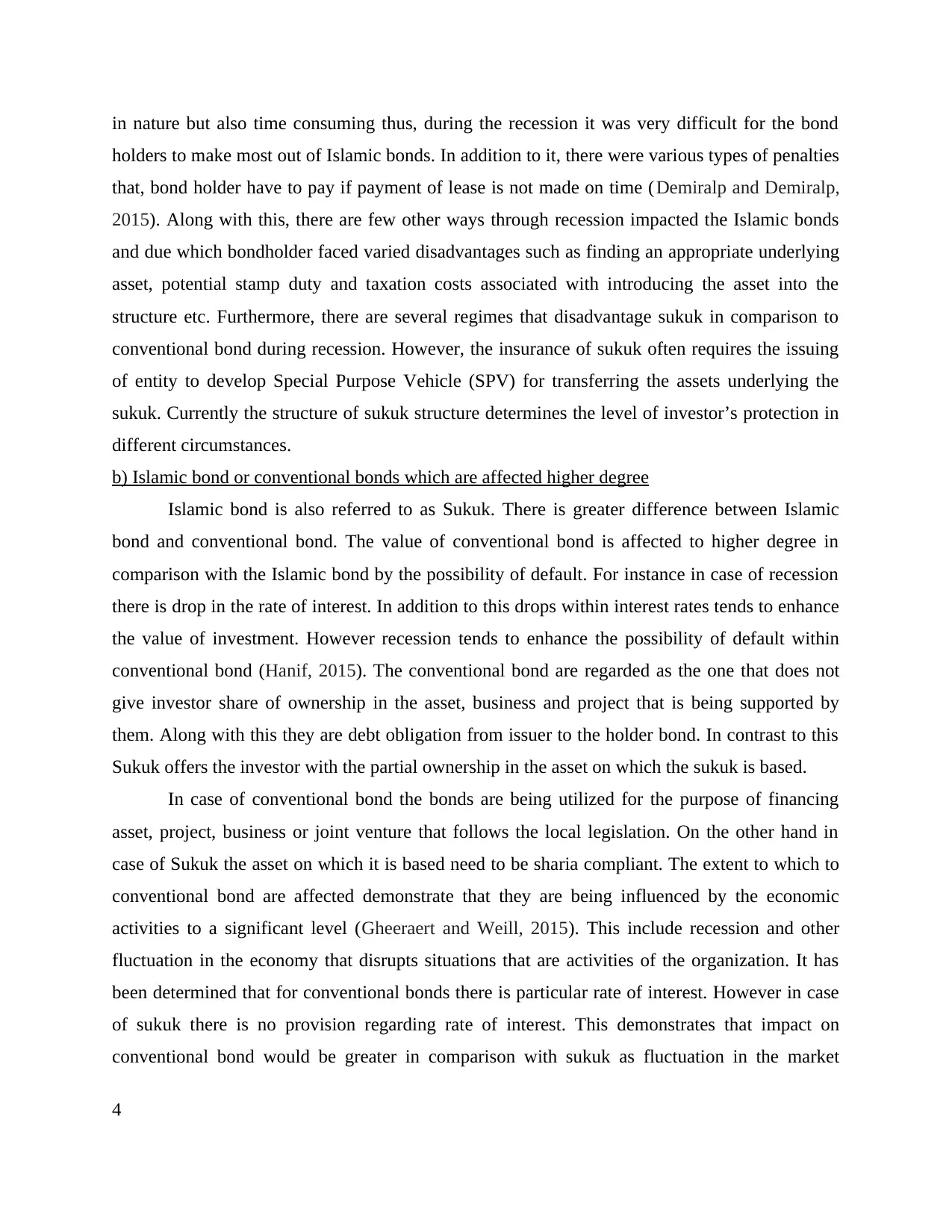
in nature but also time consuming thus, during the recession it was very difficult for the bond
holders to make most out of Islamic bonds. In addition to it, there were various types of penalties
that, bond holder have to pay if payment of lease is not made on time (Demiralp and Demiralp,
2015). Along with this, there are few other ways through recession impacted the Islamic bonds
and due which bondholder faced varied disadvantages such as finding an appropriate underlying
asset, potential stamp duty and taxation costs associated with introducing the asset into the
structure etc. Furthermore, there are several regimes that disadvantage sukuk in comparison to
conventional bond during recession. However, the insurance of sukuk often requires the issuing
of entity to develop Special Purpose Vehicle (SPV) for transferring the assets underlying the
sukuk. Currently the structure of sukuk structure determines the level of investor’s protection in
different circumstances.
b) Islamic bond or conventional bonds which are affected higher degree
Islamic bond is also referred to as Sukuk. There is greater difference between Islamic
bond and conventional bond. The value of conventional bond is affected to higher degree in
comparison with the Islamic bond by the possibility of default. For instance in case of recession
there is drop in the rate of interest. In addition to this drops within interest rates tends to enhance
the value of investment. However recession tends to enhance the possibility of default within
conventional bond (Hanif, 2015). The conventional bond are regarded as the one that does not
give investor share of ownership in the asset, business and project that is being supported by
them. Along with this they are debt obligation from issuer to the holder bond. In contrast to this
Sukuk offers the investor with the partial ownership in the asset on which the sukuk is based.
In case of conventional bond the bonds are being utilized for the purpose of financing
asset, project, business or joint venture that follows the local legislation. On the other hand in
case of Sukuk the asset on which it is based need to be sharia compliant. The extent to which to
conventional bond are affected demonstrate that they are being influenced by the economic
activities to a significant level (Gheeraert and Weill, 2015). This include recession and other
fluctuation in the economy that disrupts situations that are activities of the organization. It has
been determined that for conventional bonds there is particular rate of interest. However in case
of sukuk there is no provision regarding rate of interest. This demonstrates that impact on
conventional bond would be greater in comparison with sukuk as fluctuation in the market
4
holders to make most out of Islamic bonds. In addition to it, there were various types of penalties
that, bond holder have to pay if payment of lease is not made on time (Demiralp and Demiralp,
2015). Along with this, there are few other ways through recession impacted the Islamic bonds
and due which bondholder faced varied disadvantages such as finding an appropriate underlying
asset, potential stamp duty and taxation costs associated with introducing the asset into the
structure etc. Furthermore, there are several regimes that disadvantage sukuk in comparison to
conventional bond during recession. However, the insurance of sukuk often requires the issuing
of entity to develop Special Purpose Vehicle (SPV) for transferring the assets underlying the
sukuk. Currently the structure of sukuk structure determines the level of investor’s protection in
different circumstances.
b) Islamic bond or conventional bonds which are affected higher degree
Islamic bond is also referred to as Sukuk. There is greater difference between Islamic
bond and conventional bond. The value of conventional bond is affected to higher degree in
comparison with the Islamic bond by the possibility of default. For instance in case of recession
there is drop in the rate of interest. In addition to this drops within interest rates tends to enhance
the value of investment. However recession tends to enhance the possibility of default within
conventional bond (Hanif, 2015). The conventional bond are regarded as the one that does not
give investor share of ownership in the asset, business and project that is being supported by
them. Along with this they are debt obligation from issuer to the holder bond. In contrast to this
Sukuk offers the investor with the partial ownership in the asset on which the sukuk is based.
In case of conventional bond the bonds are being utilized for the purpose of financing
asset, project, business or joint venture that follows the local legislation. On the other hand in
case of Sukuk the asset on which it is based need to be sharia compliant. The extent to which to
conventional bond are affected demonstrate that they are being influenced by the economic
activities to a significant level (Gheeraert and Weill, 2015). This include recession and other
fluctuation in the economy that disrupts situations that are activities of the organization. It has
been determined that for conventional bonds there is particular rate of interest. However in case
of sukuk there is no provision regarding rate of interest. This demonstrates that impact on
conventional bond would be greater in comparison with sukuk as fluctuation in the market
4
Paraphrase This Document
Need a fresh take? Get an instant paraphrase of this document with our AI Paraphraser
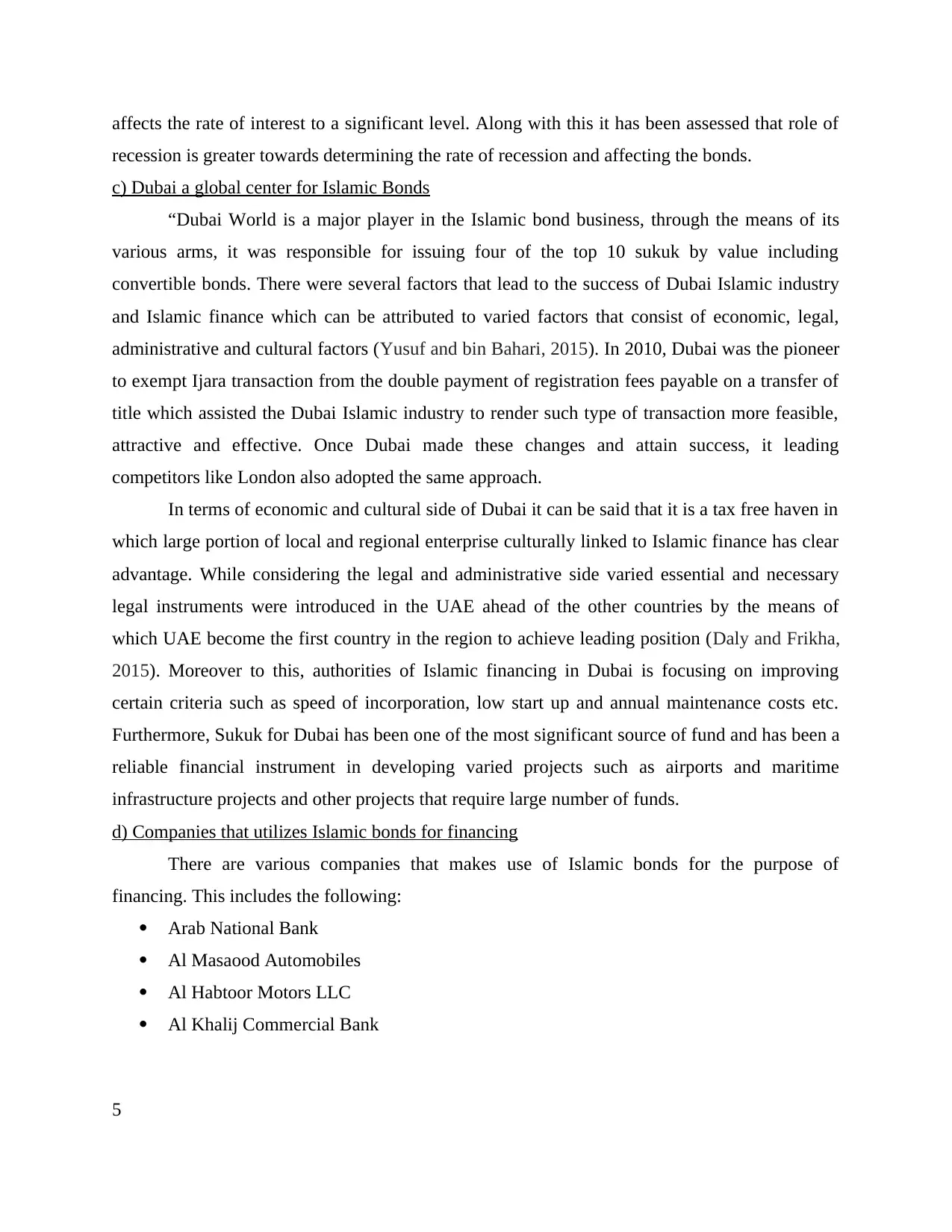
affects the rate of interest to a significant level. Along with this it has been assessed that role of
recession is greater towards determining the rate of recession and affecting the bonds.
c) Dubai a global center for Islamic Bonds
“Dubai World is a major player in the Islamic bond business, through the means of its
various arms, it was responsible for issuing four of the top 10 sukuk by value including
convertible bonds. There were several factors that lead to the success of Dubai Islamic industry
and Islamic finance which can be attributed to varied factors that consist of economic, legal,
administrative and cultural factors (Yusuf and bin Bahari, 2015). In 2010, Dubai was the pioneer
to exempt Ijara transaction from the double payment of registration fees payable on a transfer of
title which assisted the Dubai Islamic industry to render such type of transaction more feasible,
attractive and effective. Once Dubai made these changes and attain success, it leading
competitors like London also adopted the same approach.
In terms of economic and cultural side of Dubai it can be said that it is a tax free haven in
which large portion of local and regional enterprise culturally linked to Islamic finance has clear
advantage. While considering the legal and administrative side varied essential and necessary
legal instruments were introduced in the UAE ahead of the other countries by the means of
which UAE become the first country in the region to achieve leading position (Daly and Frikha,
2015). Moreover to this, authorities of Islamic financing in Dubai is focusing on improving
certain criteria such as speed of incorporation, low start up and annual maintenance costs etc.
Furthermore, Sukuk for Dubai has been one of the most significant source of fund and has been a
reliable financial instrument in developing varied projects such as airports and maritime
infrastructure projects and other projects that require large number of funds.
d) Companies that utilizes Islamic bonds for financing
There are various companies that makes use of Islamic bonds for the purpose of
financing. This includes the following:
Arab National Bank
Al Masaood Automobiles
Al Habtoor Motors LLC
Al Khalij Commercial Bank
5
recession is greater towards determining the rate of recession and affecting the bonds.
c) Dubai a global center for Islamic Bonds
“Dubai World is a major player in the Islamic bond business, through the means of its
various arms, it was responsible for issuing four of the top 10 sukuk by value including
convertible bonds. There were several factors that lead to the success of Dubai Islamic industry
and Islamic finance which can be attributed to varied factors that consist of economic, legal,
administrative and cultural factors (Yusuf and bin Bahari, 2015). In 2010, Dubai was the pioneer
to exempt Ijara transaction from the double payment of registration fees payable on a transfer of
title which assisted the Dubai Islamic industry to render such type of transaction more feasible,
attractive and effective. Once Dubai made these changes and attain success, it leading
competitors like London also adopted the same approach.
In terms of economic and cultural side of Dubai it can be said that it is a tax free haven in
which large portion of local and regional enterprise culturally linked to Islamic finance has clear
advantage. While considering the legal and administrative side varied essential and necessary
legal instruments were introduced in the UAE ahead of the other countries by the means of
which UAE become the first country in the region to achieve leading position (Daly and Frikha,
2015). Moreover to this, authorities of Islamic financing in Dubai is focusing on improving
certain criteria such as speed of incorporation, low start up and annual maintenance costs etc.
Furthermore, Sukuk for Dubai has been one of the most significant source of fund and has been a
reliable financial instrument in developing varied projects such as airports and maritime
infrastructure projects and other projects that require large number of funds.
d) Companies that utilizes Islamic bonds for financing
There are various companies that makes use of Islamic bonds for the purpose of
financing. This includes the following:
Arab National Bank
Al Masaood Automobiles
Al Habtoor Motors LLC
Al Khalij Commercial Bank
5
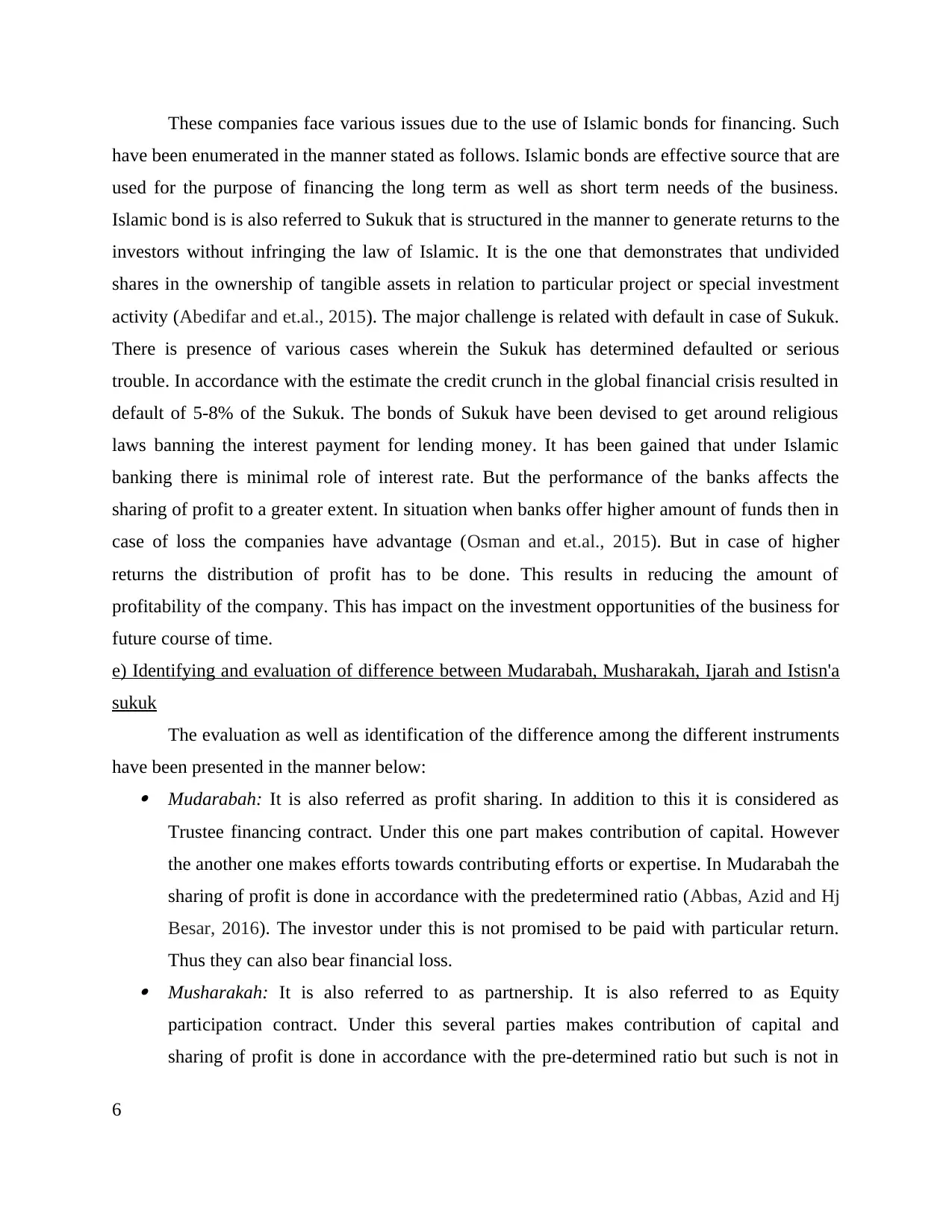
These companies face various issues due to the use of Islamic bonds for financing. Such
have been enumerated in the manner stated as follows. Islamic bonds are effective source that are
used for the purpose of financing the long term as well as short term needs of the business.
Islamic bond is is also referred to Sukuk that is structured in the manner to generate returns to the
investors without infringing the law of Islamic. It is the one that demonstrates that undivided
shares in the ownership of tangible assets in relation to particular project or special investment
activity (Abedifar and et.al., 2015). The major challenge is related with default in case of Sukuk.
There is presence of various cases wherein the Sukuk has determined defaulted or serious
trouble. In accordance with the estimate the credit crunch in the global financial crisis resulted in
default of 5-8% of the Sukuk. The bonds of Sukuk have been devised to get around religious
laws banning the interest payment for lending money. It has been gained that under Islamic
banking there is minimal role of interest rate. But the performance of the banks affects the
sharing of profit to a greater extent. In situation when banks offer higher amount of funds then in
case of loss the companies have advantage (Osman and et.al., 2015). But in case of higher
returns the distribution of profit has to be done. This results in reducing the amount of
profitability of the company. This has impact on the investment opportunities of the business for
future course of time.
e) Identifying and evaluation of difference between Mudarabah, Musharakah, Ijarah and Istisn'a
sukuk
The evaluation as well as identification of the difference among the different instruments
have been presented in the manner below: Mudarabah: It is also referred as profit sharing. In addition to this it is considered as
Trustee financing contract. Under this one part makes contribution of capital. However
the another one makes efforts towards contributing efforts or expertise. In Mudarabah the
sharing of profit is done in accordance with the predetermined ratio (Abbas, Azid and Hj
Besar, 2016). The investor under this is not promised to be paid with particular return.
Thus they can also bear financial loss. Musharakah: It is also referred to as partnership. It is also referred to as Equity
participation contract. Under this several parties makes contribution of capital and
sharing of profit is done in accordance with the pre-determined ratio but such is not in
6
have been enumerated in the manner stated as follows. Islamic bonds are effective source that are
used for the purpose of financing the long term as well as short term needs of the business.
Islamic bond is is also referred to Sukuk that is structured in the manner to generate returns to the
investors without infringing the law of Islamic. It is the one that demonstrates that undivided
shares in the ownership of tangible assets in relation to particular project or special investment
activity (Abedifar and et.al., 2015). The major challenge is related with default in case of Sukuk.
There is presence of various cases wherein the Sukuk has determined defaulted or serious
trouble. In accordance with the estimate the credit crunch in the global financial crisis resulted in
default of 5-8% of the Sukuk. The bonds of Sukuk have been devised to get around religious
laws banning the interest payment for lending money. It has been gained that under Islamic
banking there is minimal role of interest rate. But the performance of the banks affects the
sharing of profit to a greater extent. In situation when banks offer higher amount of funds then in
case of loss the companies have advantage (Osman and et.al., 2015). But in case of higher
returns the distribution of profit has to be done. This results in reducing the amount of
profitability of the company. This has impact on the investment opportunities of the business for
future course of time.
e) Identifying and evaluation of difference between Mudarabah, Musharakah, Ijarah and Istisn'a
sukuk
The evaluation as well as identification of the difference among the different instruments
have been presented in the manner below: Mudarabah: It is also referred as profit sharing. In addition to this it is considered as
Trustee financing contract. Under this one part makes contribution of capital. However
the another one makes efforts towards contributing efforts or expertise. In Mudarabah the
sharing of profit is done in accordance with the predetermined ratio (Abbas, Azid and Hj
Besar, 2016). The investor under this is not promised to be paid with particular return.
Thus they can also bear financial loss. Musharakah: It is also referred to as partnership. It is also referred to as Equity
participation contract. Under this several parties makes contribution of capital and
sharing of profit is done in accordance with the pre-determined ratio but such is not in
6
⊘ This is a preview!⊘
Do you want full access?
Subscribe today to unlock all pages.

Trusted by 1+ million students worldwide
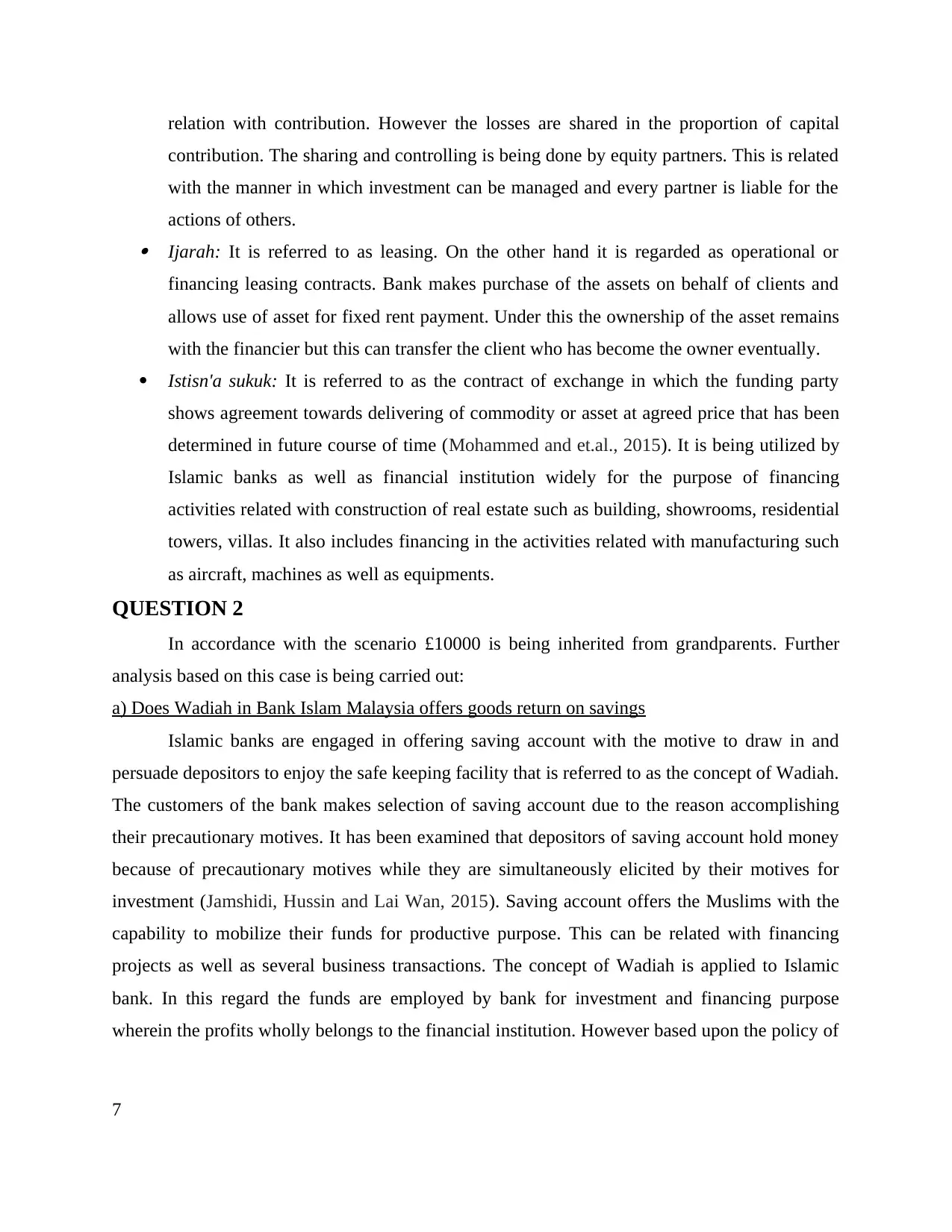
relation with contribution. However the losses are shared in the proportion of capital
contribution. The sharing and controlling is being done by equity partners. This is related
with the manner in which investment can be managed and every partner is liable for the
actions of others. Ijarah: It is referred to as leasing. On the other hand it is regarded as operational or
financing leasing contracts. Bank makes purchase of the assets on behalf of clients and
allows use of asset for fixed rent payment. Under this the ownership of the asset remains
with the financier but this can transfer the client who has become the owner eventually.
Istisn'a sukuk: It is referred to as the contract of exchange in which the funding party
shows agreement towards delivering of commodity or asset at agreed price that has been
determined in future course of time (Mohammed and et.al., 2015). It is being utilized by
Islamic banks as well as financial institution widely for the purpose of financing
activities related with construction of real estate such as building, showrooms, residential
towers, villas. It also includes financing in the activities related with manufacturing such
as aircraft, machines as well as equipments.
QUESTION 2
In accordance with the scenario £10000 is being inherited from grandparents. Further
analysis based on this case is being carried out:
a) Does Wadiah in Bank Islam Malaysia offers goods return on savings
Islamic banks are engaged in offering saving account with the motive to draw in and
persuade depositors to enjoy the safe keeping facility that is referred to as the concept of Wadiah.
The customers of the bank makes selection of saving account due to the reason accomplishing
their precautionary motives. It has been examined that depositors of saving account hold money
because of precautionary motives while they are simultaneously elicited by their motives for
investment (Jamshidi, Hussin and Lai Wan, 2015). Saving account offers the Muslims with the
capability to mobilize their funds for productive purpose. This can be related with financing
projects as well as several business transactions. The concept of Wadiah is applied to Islamic
bank. In this regard the funds are employed by bank for investment and financing purpose
wherein the profits wholly belongs to the financial institution. However based upon the policy of
7
contribution. The sharing and controlling is being done by equity partners. This is related
with the manner in which investment can be managed and every partner is liable for the
actions of others. Ijarah: It is referred to as leasing. On the other hand it is regarded as operational or
financing leasing contracts. Bank makes purchase of the assets on behalf of clients and
allows use of asset for fixed rent payment. Under this the ownership of the asset remains
with the financier but this can transfer the client who has become the owner eventually.
Istisn'a sukuk: It is referred to as the contract of exchange in which the funding party
shows agreement towards delivering of commodity or asset at agreed price that has been
determined in future course of time (Mohammed and et.al., 2015). It is being utilized by
Islamic banks as well as financial institution widely for the purpose of financing
activities related with construction of real estate such as building, showrooms, residential
towers, villas. It also includes financing in the activities related with manufacturing such
as aircraft, machines as well as equipments.
QUESTION 2
In accordance with the scenario £10000 is being inherited from grandparents. Further
analysis based on this case is being carried out:
a) Does Wadiah in Bank Islam Malaysia offers goods return on savings
Islamic banks are engaged in offering saving account with the motive to draw in and
persuade depositors to enjoy the safe keeping facility that is referred to as the concept of Wadiah.
The customers of the bank makes selection of saving account due to the reason accomplishing
their precautionary motives. It has been examined that depositors of saving account hold money
because of precautionary motives while they are simultaneously elicited by their motives for
investment (Jamshidi, Hussin and Lai Wan, 2015). Saving account offers the Muslims with the
capability to mobilize their funds for productive purpose. This can be related with financing
projects as well as several business transactions. The concept of Wadiah is applied to Islamic
bank. In this regard the funds are employed by bank for investment and financing purpose
wherein the profits wholly belongs to the financial institution. However based upon the policy of
7
Paraphrase This Document
Need a fresh take? Get an instant paraphrase of this document with our AI Paraphraser

bank, it can reward the depositor at its own discretion. It has been viewed that Islamic bank holds
prerogative over the distribution policy of profit in form of gift known as hiba.
The return by the Islamic bank to the holder of saving account is considered as gift. This
is referred to as hiba. Hiba is regarded as the rewarding profit that is offered to customers and
highly depends on the performance of the bank. It is very common for every bank providing
saving account to offer hiba as an incentive with the aim to attract customers to make selection
of its Islamic banking products (Ezeh, Nwankwo and Obiesie, 2015). In situation of the bank
generates greater amount of profitability from its banking business then huge amount of hiba is
being given. Further this is credited to the saving account of the customer. In situation if the bank
is running in loss the hiba would not be allocated. Moreover the customers would not lose the
amount that is deposited in the bank. In Islamic bank the savers can earn good return but this is
not through receiving interest but by the means of sharing profitability of the bank. Thus it can
be said that Wadiah can in Bank Islam Malaysia offers sound return but only in case when the
bank has made sound performance. In case of bad year the Islamic bank might not pay share of
profit to the customers.
b) Opportunity risk and manner in which it can be addressed
Opportunity risk is referred to as the probability of loss originating when the resources
are irreversibly committed towards one opportunity and a better opportunity is present itself. In
other words it is considered as the risk that a better opportunity is present itself after irreversible
decision is being made. It has been assumed that the amount inherited that is £10000 from
grandparent is deposited in Wadiah which is saving account. This is regarded as opportunity risk.
Such is due to the the reason that better opportunity is lost which is related with making deposit
in the conventional account. Further if the decision of depositing the amount in Wadiah is taken
then such as irreversible (Ibrahim, 2015). This presents that the amount deposited cannot be
taken back, once it is being deposited within that particular span of time. In case amount is
deposited in the saving account then the value of return largely depends on the performance of
the bank. In situation the bank has performed well then the good return would be received.
However in bad condition the return would not be offered. This can be greater disadvantage for
the depositor. In contrast to this under conventional one the return in fixed. It does not depend on
whether the bank has made profit or not. Thus if the amount is being deposited in the Islamic
8
prerogative over the distribution policy of profit in form of gift known as hiba.
The return by the Islamic bank to the holder of saving account is considered as gift. This
is referred to as hiba. Hiba is regarded as the rewarding profit that is offered to customers and
highly depends on the performance of the bank. It is very common for every bank providing
saving account to offer hiba as an incentive with the aim to attract customers to make selection
of its Islamic banking products (Ezeh, Nwankwo and Obiesie, 2015). In situation of the bank
generates greater amount of profitability from its banking business then huge amount of hiba is
being given. Further this is credited to the saving account of the customer. In situation if the bank
is running in loss the hiba would not be allocated. Moreover the customers would not lose the
amount that is deposited in the bank. In Islamic bank the savers can earn good return but this is
not through receiving interest but by the means of sharing profitability of the bank. Thus it can
be said that Wadiah can in Bank Islam Malaysia offers sound return but only in case when the
bank has made sound performance. In case of bad year the Islamic bank might not pay share of
profit to the customers.
b) Opportunity risk and manner in which it can be addressed
Opportunity risk is referred to as the probability of loss originating when the resources
are irreversibly committed towards one opportunity and a better opportunity is present itself. In
other words it is considered as the risk that a better opportunity is present itself after irreversible
decision is being made. It has been assumed that the amount inherited that is £10000 from
grandparent is deposited in Wadiah which is saving account. This is regarded as opportunity risk.
Such is due to the the reason that better opportunity is lost which is related with making deposit
in the conventional account. Further if the decision of depositing the amount in Wadiah is taken
then such as irreversible (Ibrahim, 2015). This presents that the amount deposited cannot be
taken back, once it is being deposited within that particular span of time. In case amount is
deposited in the saving account then the value of return largely depends on the performance of
the bank. In situation the bank has performed well then the good return would be received.
However in bad condition the return would not be offered. This can be greater disadvantage for
the depositor. In contrast to this under conventional one the return in fixed. It does not depend on
whether the bank has made profit or not. Thus if the amount is being deposited in the Islamic
8
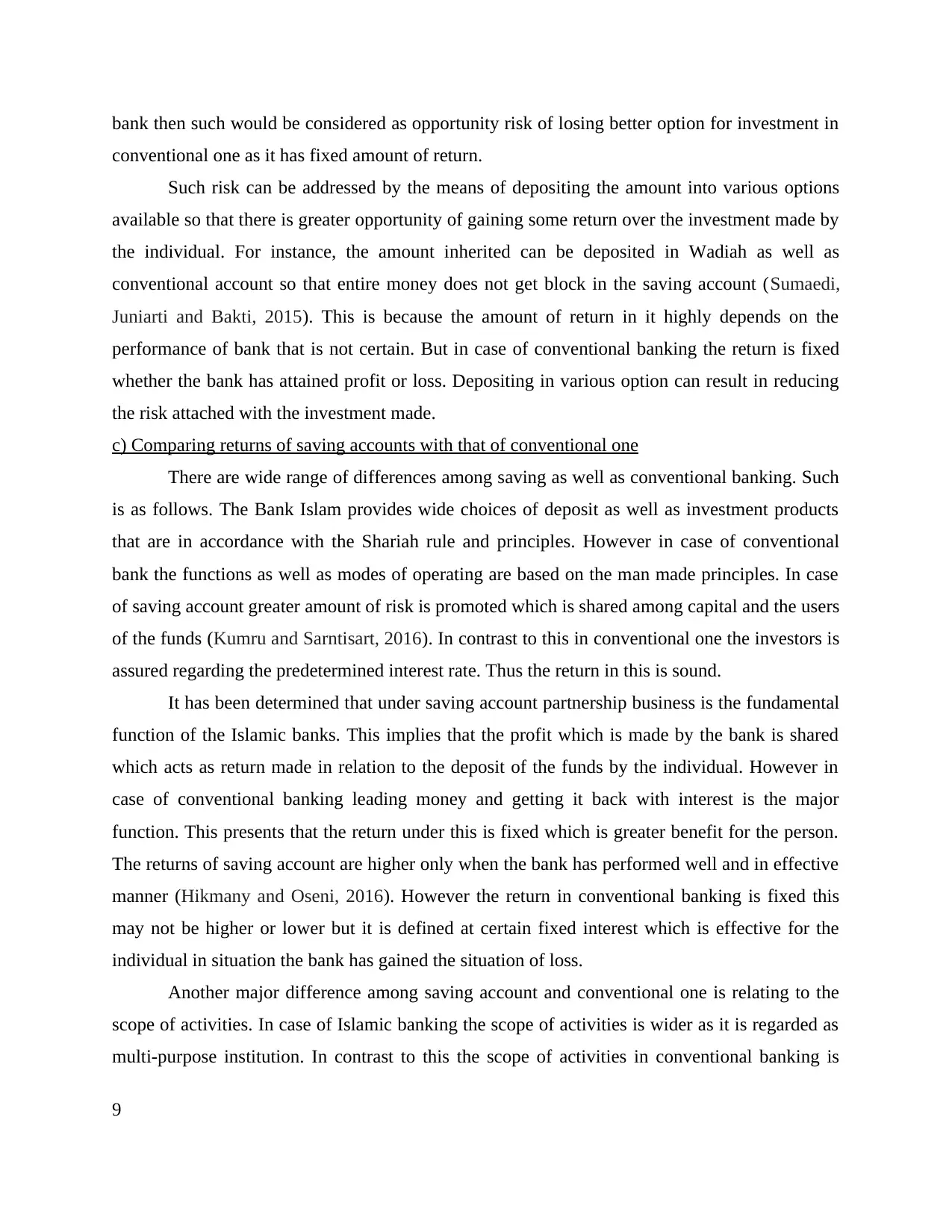
bank then such would be considered as opportunity risk of losing better option for investment in
conventional one as it has fixed amount of return.
Such risk can be addressed by the means of depositing the amount into various options
available so that there is greater opportunity of gaining some return over the investment made by
the individual. For instance, the amount inherited can be deposited in Wadiah as well as
conventional account so that entire money does not get block in the saving account (Sumaedi,
Juniarti and Bakti, 2015). This is because the amount of return in it highly depends on the
performance of bank that is not certain. But in case of conventional banking the return is fixed
whether the bank has attained profit or loss. Depositing in various option can result in reducing
the risk attached with the investment made.
c) Comparing returns of saving accounts with that of conventional one
There are wide range of differences among saving as well as conventional banking. Such
is as follows. The Bank Islam provides wide choices of deposit as well as investment products
that are in accordance with the Shariah rule and principles. However in case of conventional
bank the functions as well as modes of operating are based on the man made principles. In case
of saving account greater amount of risk is promoted which is shared among capital and the users
of the funds (Kumru and Sarntisart, 2016). In contrast to this in conventional one the investors is
assured regarding the predetermined interest rate. Thus the return in this is sound.
It has been determined that under saving account partnership business is the fundamental
function of the Islamic banks. This implies that the profit which is made by the bank is shared
which acts as return made in relation to the deposit of the funds by the individual. However in
case of conventional banking leading money and getting it back with interest is the major
function. This presents that the return under this is fixed which is greater benefit for the person.
The returns of saving account are higher only when the bank has performed well and in effective
manner (Hikmany and Oseni, 2016). However the return in conventional banking is fixed this
may not be higher or lower but it is defined at certain fixed interest which is effective for the
individual in situation the bank has gained the situation of loss.
Another major difference among saving account and conventional one is relating to the
scope of activities. In case of Islamic banking the scope of activities is wider as it is regarded as
multi-purpose institution. In contrast to this the scope of activities in conventional banking is
9
conventional one as it has fixed amount of return.
Such risk can be addressed by the means of depositing the amount into various options
available so that there is greater opportunity of gaining some return over the investment made by
the individual. For instance, the amount inherited can be deposited in Wadiah as well as
conventional account so that entire money does not get block in the saving account (Sumaedi,
Juniarti and Bakti, 2015). This is because the amount of return in it highly depends on the
performance of bank that is not certain. But in case of conventional banking the return is fixed
whether the bank has attained profit or loss. Depositing in various option can result in reducing
the risk attached with the investment made.
c) Comparing returns of saving accounts with that of conventional one
There are wide range of differences among saving as well as conventional banking. Such
is as follows. The Bank Islam provides wide choices of deposit as well as investment products
that are in accordance with the Shariah rule and principles. However in case of conventional
bank the functions as well as modes of operating are based on the man made principles. In case
of saving account greater amount of risk is promoted which is shared among capital and the users
of the funds (Kumru and Sarntisart, 2016). In contrast to this in conventional one the investors is
assured regarding the predetermined interest rate. Thus the return in this is sound.
It has been determined that under saving account partnership business is the fundamental
function of the Islamic banks. This implies that the profit which is made by the bank is shared
which acts as return made in relation to the deposit of the funds by the individual. However in
case of conventional banking leading money and getting it back with interest is the major
function. This presents that the return under this is fixed which is greater benefit for the person.
The returns of saving account are higher only when the bank has performed well and in effective
manner (Hikmany and Oseni, 2016). However the return in conventional banking is fixed this
may not be higher or lower but it is defined at certain fixed interest which is effective for the
individual in situation the bank has gained the situation of loss.
Another major difference among saving account and conventional one is relating to the
scope of activities. In case of Islamic banking the scope of activities is wider as it is regarded as
multi-purpose institution. In contrast to this the scope of activities in conventional banking is
9
⊘ This is a preview!⊘
Do you want full access?
Subscribe today to unlock all pages.

Trusted by 1+ million students worldwide

narrower. It has been determined that conventional bank pay greater importance towards the
creditworthiness of the customers. However Islamic bank gives importance to the project
viability. In conventional bank the major aim is to maximize the profit without any restrictions.
On the other hand the aim of the saving account relates with the maximization of the profit but
this subject to restrictions of Shariah. In case of defaulter the conventional bank charge
additional money. However in case of Islamic banks there is no provision regarding charging of
extra money from defaulters. In saving account the return is referred to as hiba but such is not
promised by the bank (Fofana, 2015). However bank offers interest rates that is being promised.
In saving account the bank with high profit represents that depositor can earn more hiba, while in
situation of loss less hiba would be rewarded. On the contrary interest paid is constant in
conventional account which is regardless of whether the bank has generated profit or operating at
loss.
d) Investment opportunities that can benefit from Islamic banking and finance industry
When the funds are taken from Islamic banking and invested in the different aspect then
such has huge number of benefits. This is in relation with justice and fairness. The major feature
of the Islamic model is that it is based on the principle of profit sharing. This implies that the risk
is shared among the bank as well as customers. With the presence of such system relating with
financial intermediation there is greater contribution to more equitable income as well as wealth
distribution (Ahmad, 2016). Under Islamic banking the profit or loss generated by particular
investment option is shared between the customer and bank. However the risk of loss is not
wholly is burden over the customer. This acts as major benefit that assist the particular individual
as well as organization to a greater extent (Ferhi and Chkoundali, 2015). Another major
advantage presents the Islamic banking complies with the principle of profit and loss sharing.
This principle assist in mobilizing the resources. Further they are less likely to experience sudden
run over deposit. As they possess minimum requirement for maintenance of high liquidity. The
investment opportunities are benefited in terms that that the bank does not pay greater
importance to the creditworthiness of the customer while offering loan. However they give
importance to the ability of the project towards generating income. This is due to the reason that
under this there is no requirement towards repayment of amount taken from the bank rather the
sharing of loss and profit in pre-defined proportion is done. There is no fixed obligation such as
10
creditworthiness of the customers. However Islamic bank gives importance to the project
viability. In conventional bank the major aim is to maximize the profit without any restrictions.
On the other hand the aim of the saving account relates with the maximization of the profit but
this subject to restrictions of Shariah. In case of defaulter the conventional bank charge
additional money. However in case of Islamic banks there is no provision regarding charging of
extra money from defaulters. In saving account the return is referred to as hiba but such is not
promised by the bank (Fofana, 2015). However bank offers interest rates that is being promised.
In saving account the bank with high profit represents that depositor can earn more hiba, while in
situation of loss less hiba would be rewarded. On the contrary interest paid is constant in
conventional account which is regardless of whether the bank has generated profit or operating at
loss.
d) Investment opportunities that can benefit from Islamic banking and finance industry
When the funds are taken from Islamic banking and invested in the different aspect then
such has huge number of benefits. This is in relation with justice and fairness. The major feature
of the Islamic model is that it is based on the principle of profit sharing. This implies that the risk
is shared among the bank as well as customers. With the presence of such system relating with
financial intermediation there is greater contribution to more equitable income as well as wealth
distribution (Ahmad, 2016). Under Islamic banking the profit or loss generated by particular
investment option is shared between the customer and bank. However the risk of loss is not
wholly is burden over the customer. This acts as major benefit that assist the particular individual
as well as organization to a greater extent (Ferhi and Chkoundali, 2015). Another major
advantage presents the Islamic banking complies with the principle of profit and loss sharing.
This principle assist in mobilizing the resources. Further they are less likely to experience sudden
run over deposit. As they possess minimum requirement for maintenance of high liquidity. The
investment opportunities are benefited in terms that that the bank does not pay greater
importance to the creditworthiness of the customer while offering loan. However they give
importance to the ability of the project towards generating income. This is due to the reason that
under this there is no requirement towards repayment of amount taken from the bank rather the
sharing of loss and profit in pre-defined proportion is done. There is no fixed obligation such as
10
Paraphrase This Document
Need a fresh take? Get an instant paraphrase of this document with our AI Paraphraser
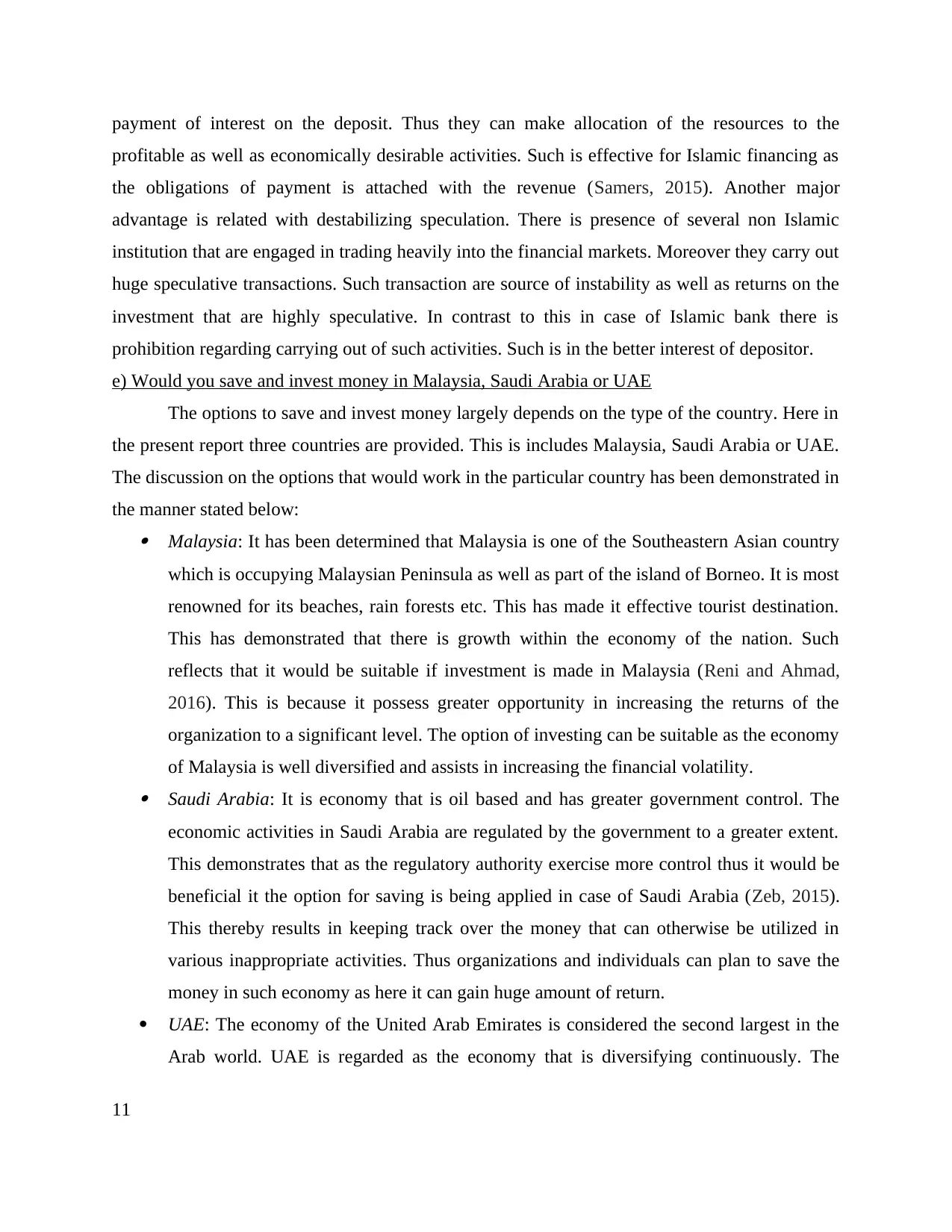
payment of interest on the deposit. Thus they can make allocation of the resources to the
profitable as well as economically desirable activities. Such is effective for Islamic financing as
the obligations of payment is attached with the revenue (Samers, 2015). Another major
advantage is related with destabilizing speculation. There is presence of several non Islamic
institution that are engaged in trading heavily into the financial markets. Moreover they carry out
huge speculative transactions. Such transaction are source of instability as well as returns on the
investment that are highly speculative. In contrast to this in case of Islamic bank there is
prohibition regarding carrying out of such activities. Such is in the better interest of depositor.
e) Would you save and invest money in Malaysia, Saudi Arabia or UAE
The options to save and invest money largely depends on the type of the country. Here in
the present report three countries are provided. This is includes Malaysia, Saudi Arabia or UAE.
The discussion on the options that would work in the particular country has been demonstrated in
the manner stated below: Malaysia: It has been determined that Malaysia is one of the Southeastern Asian country
which is occupying Malaysian Peninsula as well as part of the island of Borneo. It is most
renowned for its beaches, rain forests etc. This has made it effective tourist destination.
This has demonstrated that there is growth within the economy of the nation. Such
reflects that it would be suitable if investment is made in Malaysia (Reni and Ahmad,
2016). This is because it possess greater opportunity in increasing the returns of the
organization to a significant level. The option of investing can be suitable as the economy
of Malaysia is well diversified and assists in increasing the financial volatility. Saudi Arabia: It is economy that is oil based and has greater government control. The
economic activities in Saudi Arabia are regulated by the government to a greater extent.
This demonstrates that as the regulatory authority exercise more control thus it would be
beneficial it the option for saving is being applied in case of Saudi Arabia (Zeb, 2015).
This thereby results in keeping track over the money that can otherwise be utilized in
various inappropriate activities. Thus organizations and individuals can plan to save the
money in such economy as here it can gain huge amount of return.
UAE: The economy of the United Arab Emirates is considered the second largest in the
Arab world. UAE is regarded as the economy that is diversifying continuously. The
11
profitable as well as economically desirable activities. Such is effective for Islamic financing as
the obligations of payment is attached with the revenue (Samers, 2015). Another major
advantage is related with destabilizing speculation. There is presence of several non Islamic
institution that are engaged in trading heavily into the financial markets. Moreover they carry out
huge speculative transactions. Such transaction are source of instability as well as returns on the
investment that are highly speculative. In contrast to this in case of Islamic bank there is
prohibition regarding carrying out of such activities. Such is in the better interest of depositor.
e) Would you save and invest money in Malaysia, Saudi Arabia or UAE
The options to save and invest money largely depends on the type of the country. Here in
the present report three countries are provided. This is includes Malaysia, Saudi Arabia or UAE.
The discussion on the options that would work in the particular country has been demonstrated in
the manner stated below: Malaysia: It has been determined that Malaysia is one of the Southeastern Asian country
which is occupying Malaysian Peninsula as well as part of the island of Borneo. It is most
renowned for its beaches, rain forests etc. This has made it effective tourist destination.
This has demonstrated that there is growth within the economy of the nation. Such
reflects that it would be suitable if investment is made in Malaysia (Reni and Ahmad,
2016). This is because it possess greater opportunity in increasing the returns of the
organization to a significant level. The option of investing can be suitable as the economy
of Malaysia is well diversified and assists in increasing the financial volatility. Saudi Arabia: It is economy that is oil based and has greater government control. The
economic activities in Saudi Arabia are regulated by the government to a greater extent.
This demonstrates that as the regulatory authority exercise more control thus it would be
beneficial it the option for saving is being applied in case of Saudi Arabia (Zeb, 2015).
This thereby results in keeping track over the money that can otherwise be utilized in
various inappropriate activities. Thus organizations and individuals can plan to save the
money in such economy as here it can gain huge amount of return.
UAE: The economy of the United Arab Emirates is considered the second largest in the
Arab world. UAE is regarded as the economy that is diversifying continuously. The
11
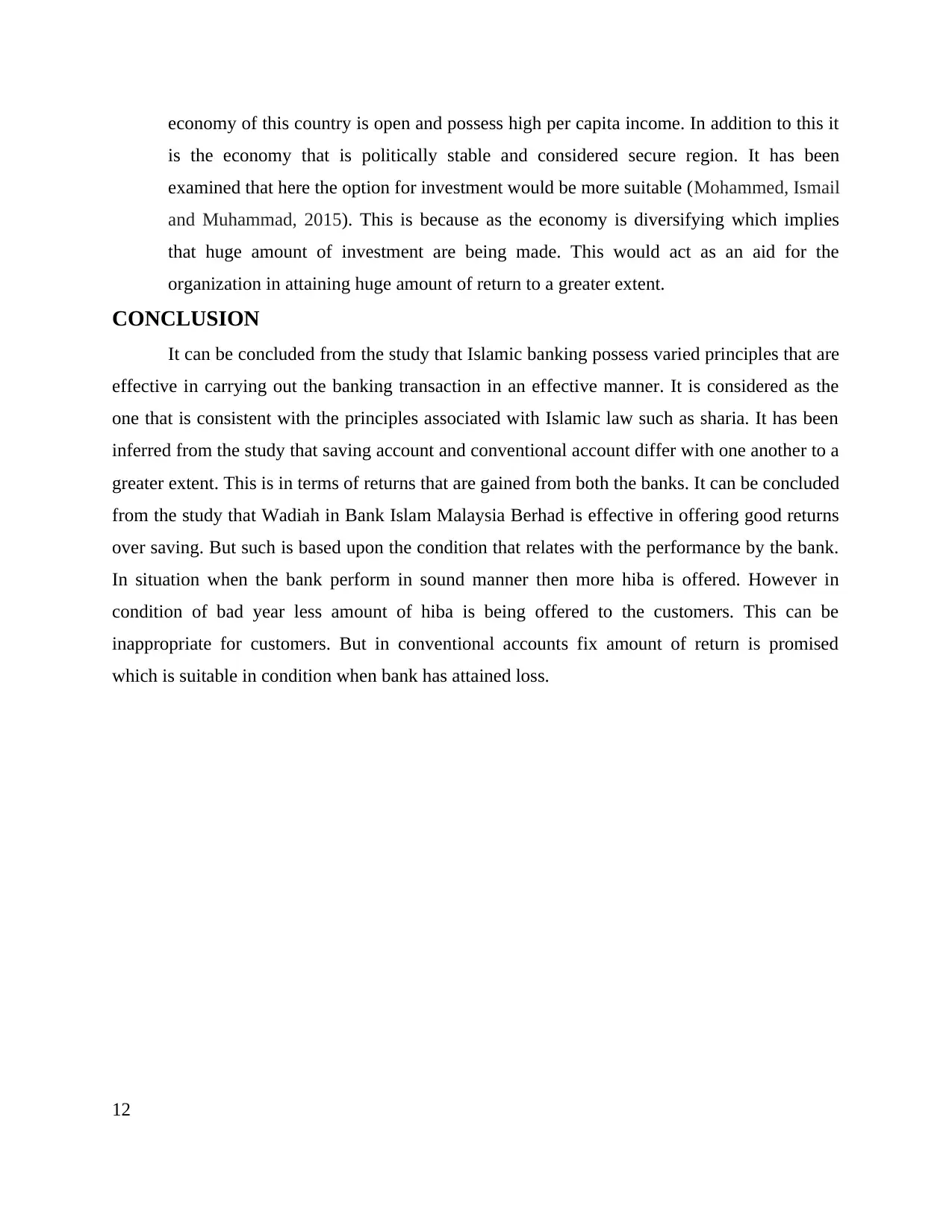
economy of this country is open and possess high per capita income. In addition to this it
is the economy that is politically stable and considered secure region. It has been
examined that here the option for investment would be more suitable (Mohammed, Ismail
and Muhammad, 2015). This is because as the economy is diversifying which implies
that huge amount of investment are being made. This would act as an aid for the
organization in attaining huge amount of return to a greater extent.
CONCLUSION
It can be concluded from the study that Islamic banking possess varied principles that are
effective in carrying out the banking transaction in an effective manner. It is considered as the
one that is consistent with the principles associated with Islamic law such as sharia. It has been
inferred from the study that saving account and conventional account differ with one another to a
greater extent. This is in terms of returns that are gained from both the banks. It can be concluded
from the study that Wadiah in Bank Islam Malaysia Berhad is effective in offering good returns
over saving. But such is based upon the condition that relates with the performance by the bank.
In situation when the bank perform in sound manner then more hiba is offered. However in
condition of bad year less amount of hiba is being offered to the customers. This can be
inappropriate for customers. But in conventional accounts fix amount of return is promised
which is suitable in condition when bank has attained loss.
12
is the economy that is politically stable and considered secure region. It has been
examined that here the option for investment would be more suitable (Mohammed, Ismail
and Muhammad, 2015). This is because as the economy is diversifying which implies
that huge amount of investment are being made. This would act as an aid for the
organization in attaining huge amount of return to a greater extent.
CONCLUSION
It can be concluded from the study that Islamic banking possess varied principles that are
effective in carrying out the banking transaction in an effective manner. It is considered as the
one that is consistent with the principles associated with Islamic law such as sharia. It has been
inferred from the study that saving account and conventional account differ with one another to a
greater extent. This is in terms of returns that are gained from both the banks. It can be concluded
from the study that Wadiah in Bank Islam Malaysia Berhad is effective in offering good returns
over saving. But such is based upon the condition that relates with the performance by the bank.
In situation when the bank perform in sound manner then more hiba is offered. However in
condition of bad year less amount of hiba is being offered to the customers. This can be
inappropriate for customers. But in conventional accounts fix amount of return is promised
which is suitable in condition when bank has attained loss.
12
⊘ This is a preview!⊘
Do you want full access?
Subscribe today to unlock all pages.

Trusted by 1+ million students worldwide
1 out of 15
Related Documents
Your All-in-One AI-Powered Toolkit for Academic Success.
+13062052269
info@desklib.com
Available 24*7 on WhatsApp / Email
![[object Object]](/_next/static/media/star-bottom.7253800d.svg)
Unlock your academic potential
Copyright © 2020–2026 A2Z Services. All Rights Reserved. Developed and managed by ZUCOL.





